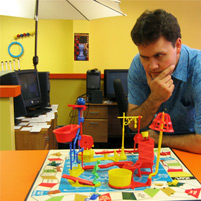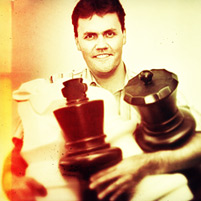Game Changer


Jesse Schell
It seems everybody is playing games these days.
A video game explosion in recent years has put the pastime in the hands of everyone from three-year-olds to grandmas. Should we be concerned?
Carnegie Mellon University's gaming expert Jesse Schell, the first individual to be honored with the Game Changer Award, explains how this hobby is actually making the world a better place.
"Parents worry that their kids are spending too much time on video games. Well, you shouldn't eat too much candy either. Or carrots. And you shouldn't listen to too much rock 'n' roll. But that doesn't mean there aren't good things about them," said Schell, a video game designer, acclaimed author, CEO of Schell Games and a Distinguished Professor of the Practice of Entertainment Technology at Carnegie Mellon's Entertainment Technology Center (ETC).
"As a parent, you should really be playing the video games with your kid. First of all, that's time you're spending together. And it opens the door to having that conversation about how much is too much."
Schell explains that kids have to do a lot of problem solving to win games.
"You don't win by just sitting there. You have to keep trying. Games help kids understand about persistence and patience. A lot of games involve working with others as a team in order to succeed, and there is real value in that as well."
His company, Schell Games, is focused primarily on what he likes to call "transformational" games.
"For a while, people were saying 'serious' games, which I think is a problematic phrase because it implies that the games shouldn't be fun," he said.
Transformational games include ones that work at the societal level, such as "FoldIt," which CMU's Adrien Truille helped to create.
"There is a difficult problem in the way proteins fold. If you can understand how proteins fold, it can help you design new drugs and solve all kinds of medical problems," he explained.
"Experts weren't able to figure it out, and supercomputers couldn't do it either. So they made a video game and said to the public, 'here you go, try and fold some of these proteins.' And problems that people worked on for 10 years and were unable to solve were solved by the community, in a number of weeks."
Schell is also a proponent of games designed to change the individual, such as "Play Forward" which was designed by Schell Games and Yale Medical to reduce the risk of HIV in young teenagers.
"There is a multi-year study going on with kids who've played this game to see whether it's made a difference in their lives," Schell said.
"Play Forward" took home a Gold Medal Award at this year's Serious Play Conference at the DigiPen Institute of Technology. The conference's International Serious Play Awards honor games geared toward teaching, business, health awareness or advocacy.
If you want to know where gaming is headed next, look to education.
"There's a big explosion of gaming into the educational space right now because we're about to see the end of textbooks. They're going to be replaced by tablets because it's going to save so much money," Schell said.
"Once you're doing that, everyone's kind of saying, well, why would you just stick a book on there? Why wouldn't we use the power of the medium? There are big opportunities there. And that's a lot of what Schell Games is focused on."
Through their latest project, Game Sprout, Schell Games is inviting people who are interested in trying to make games to bring their ideas forward.
"Lots of people just have an idea, or they like to do art, or maybe only coding and they don't know how to get the thing going. We want to help people get their games done."
Approximately 36 percent of Schell Games' employees are CMU graduates, spanning the disciplines of art, design and engineering as well as production and operations. Schell said he started hiring them back when he was working for Disney because "we never had students who could hit the ground running, join a team, and be so useful so fast."
CMU is ranked No. 2 on Animation Career Review's list of Top 50 Schools in the U.S. for Game Design and Development. Schell says that's because it's very unusual that a school is equally strong in both art and computer science.
"In terms of the ETC specifically, part of the reason I think we've got such a good reputation is that we’ve been very focused on what it takes to be a leader in entertainment technology," Schell explained.
"The key to it is being able to work with people outside of your discipline. We focus a great deal on how to work with people who are good at something that you're not good at, so that as a team you can make something that none of you could have done alone."
Related Links: Entertainment Technology Center | JesseSchell.com | Schell Games | School of Computer Science | College of Fine Arts
